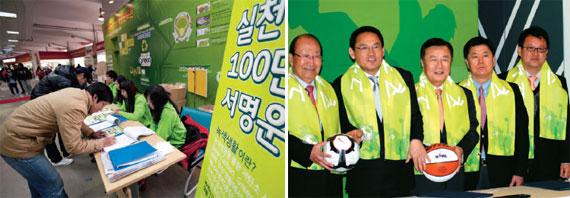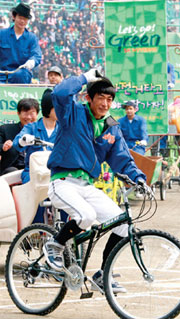
|
 |
Popular sports are turning green in Korea.
Just before the official opening of the season’s baseball game, the Korea Baseball Organization (KBO) and Korea Energy Management Corporation held a ceremony for the declaration of green sports. The “green sports campaign,” as it is called, includes pledges to reduce playing hours, replace existing lighting with LED illumination or solar-powered lighting and promote other activities to protect the environment.
First of all, in order to reduce total playing hours, pitchers are required to pitch within 12 seconds of the previous play. The five-minute cleaning time which takes place right after the fifth inning has been abolished. A certain percentage of money earned from ticket sales will be put into a green fund to establish a forest for baseball players. By May, the KBO will designate a Green Week, in which players who score homeruns, make saves and perform other feats during this period plant commemorative trees of their own.

Baseball stadiums are also turning green. Through budgetary support from the government and professional baseball teams, stadiums in Seoul, Daejeon, Busan and Incheon will introduce power generation that runs on photovoltaic or other renewable energy sources. LEDs will replace the old lighting system.
Munhak Stadium in Incheon will have a 456-kilowatt photovoltaic power generator, Jamsil Stadium in southeastern Seoul will receive a 100-kilowatt generator, and stadiums in Daejeon and Busan will each be installed with 70.2-kilowatt generators in the near future. Busan’s Sajik Stadium will set up a green energy experience hall. The SK Wyverns baseball club will also build an experience hall running on renewable energy within Incheon’s Munhak Stadium and use bullpen car and shuttle vehicles powered by electricity.
The KBO will produce TV commercials starring their star players to encourage their fans to participate in the green campaign. Each stadium will be equipped with bins to collect recyclable products. Signs will be put up that ask visitors to use public transportation and save electricity. The SK Wyverns will launch a Green Volunteer Group that will join club supporters to educate people about saving energy and to further promote other green campaigns.

If the green campaign goes as planned, the nation will save 500,000 toe (tone of oil equivalent) of energy, which is equivalent to the energy used by 400,000 household for a year. (One toe is produced by burning 1 tonne of crude oil.) It can reduce the level of carbon dioxide emissions by 1,537 tons, which has the same effect as planting 13,800 two-year-old pine trees.

Other sports too emit much carbon dioxide, with football stadiums that boast the largest space for practice consuming the greatest amount of electricity. According to the findings of the Ministry of Environment, the five professional sports organizations ? including K-League (soccer), Korean Basketball League (KBL), Korea Volleyball Federation (KOVO) and Women’s Korean Basketball League (WKBL) — produced a combined total of 75,598 tons of carbon dioxide emissions last year.
The government, therefore, also concluded green sports deals with those five professional sports organizations on March 26. Some of the “green” ideas include providing ticket discounts to visitors who come on a bicycle or appointing a player who contributed to reducing the total number of playing hours as a “green player.” April 19 to 25 will be designated a “Climate Change Week” and Sunday, April 25, as “Green Sports Day,” on which special functions will take place to promote the importance of the environment.
For the public, the environment ministry will offer a Me-First Guideline that instructs people to refrain from using disposable products and minimize production of garbage among other things. When the guideline is properly implemented, the ministry expects to see the reduction of 15,184 tons of carbon dioxide annually through the combined energy-saving efforts of sports organizations and fans.
*Adapted from Weekly Gonggam Magazine
By Kim Hee-sung
Korea.net Staff Writer